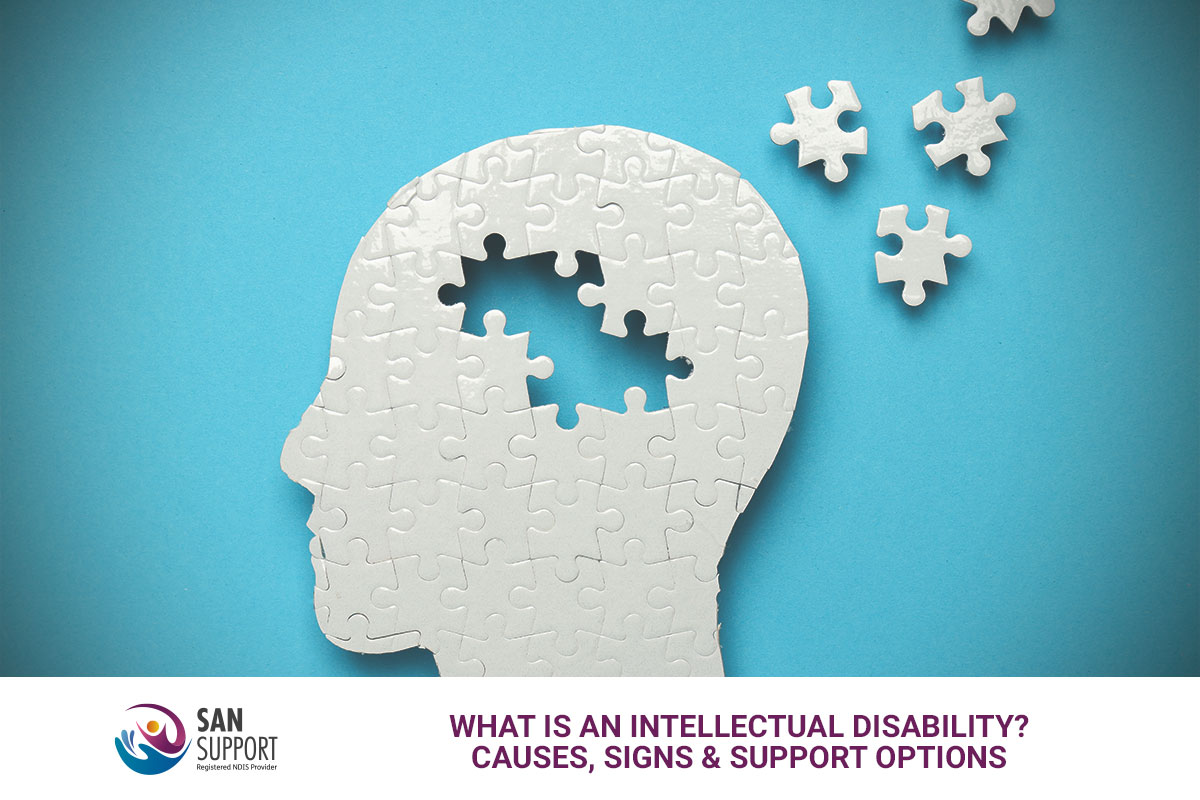
An intellectual disability is a condition that affects cognitive functioning, making it difficult for a person to learn, reason and process information. People with intellectual disabilities may struggle with problem-solving, communication, social interactions and performing everyday tasks. However, with the right support, they can lead fulfilling and independent lives.
Understanding the causes, early signs and available support services can help individuals, families and caregivers provide the best care and opportunities. This guide will explore what an intellectual disability is, how it affects people at different life stages and the support systems available through the National Disability Insurance Scheme (NDIS).
What Causes Intellectual Disabilities?
Intellectual disabilities develop due to genetic, prenatal, perinatal, or postnatal factors that affect brain development. Identifying the cause helps in planning effective interventions.
Genetic Disorders
Some intellectual disabilities occur due to chromosome abnormalities or inherited genetic conditions. Common genetic causes include:
- Down syndrome – An extra chromosome 21 causes cognitive delays, distinct physical traits and developmental challenges.
- Fragile X Syndrome – A genetic mutation on the X chromosome leads to learning disabilities, speech delays and social difficulties.
- Williams Syndrome – This disorder affects both cognitive abilities and personality traits, often leading to mild to moderate intellectual disabilities.
- Prader-Willi Syndrome – A genetic condition affecting appetite regulation, behaviour and cognitive skills.
Prenatal Factors (Before Birth)
During pregnancy, certain factors can interfere with a baby’s brain development:
- Maternal infections such as rubella, toxoplasmosis, or cytomegalovirus.
- Exposure to alcohol, drugs, or toxins, leading to Fatal Alcohol Spectrum Disorder (FASD).
- Malnutrition, which deprives the foetus of essential nutrients for brain growth.
Perinatal Factors (During Birth)
Complications during delivery can lead to brain damage and intellectual disabilities. Common perinatal causes include:
- Oxygen deprivation at birth, also known as birth asphyxia.
- Premature birth or low birth weight, increasing the risk of developmental delays.
- Birth injuries, such as head trauma during delivery.
Postnatal Factors (After Birth)
After birth, external factors can influence brain development and lead to intellectual disabilities. These include:
- Severe infections like meningitis or encephalitis, which cause brain inflammation.
- Traumatic brain injuries from accidents, abuse, or falls.
- Chronic malnutrition, preventing proper brain development.
- Lead poisoning or exposure to environmental toxins.
Since intellectual disability have multiple possible causes, doctors may use genetic testing, brain scans and developmental assessments to determine the best care plan.
Early Signs of Intellectual Disability
Recognising the early symptoms of an intellectual disability allows for timely intervention, which improves long-term outcomes. Parents and caregivers should watch for delayed developmental milestones in infants and young children.
Developmental Red Flags
- Delayed motor skills – Difficulty sitting, crawling, or walking compared to peers.
- Speech delays – Trouble forming words, sentences, or understanding instructions.
- Memory difficulties – Struggling to recall basic information or routines.
- Problem-solving challenges – Difficulty recognising patterns or making decisions.
- Lack of social awareness – Limited eye contact, difficulty understanding emotions, or struggling to engage with peers.
- Dependence on caregivers – Trouble with feeding, dressing, or using the toilet without assistance.
If a child consistently experiences these challenges, consulting a specialist can lead to early interventions that enhance development and quality of life.
How Intellectual Disability Affect Adolescents and Adults
As children grow into teenagers and adults, intellectual disabilities impact their education, employment, relationships and independent living skills. However, with structured support, they can develop adaptive strategies to live fulfilling lives.
Learning and Cognitive Skills
- Struggles with reading, writing, or basic math.
- Slower learning pace and difficulty retaining new information.
- Challenges in understanding abstract concepts like time and money.
Social and Emotional Development
- Difficulty interpreting facial expressions and social cues.
- Struggles with building and maintaining friendships.
- Vulnerability to exploitation or manipulation.
- Emotional regulation challenges, requiring guidance and coping strategies.
Practical Life Skills
- Learning to perform daily tasks like cooking, cleaning and personal hygiene with support.
- Assistance with handling money, budgeting and banking.
- Need for vocational training or supported employment.
- Difficulty using public transportation or navigating unfamiliar places.
With the right support networks, education and job opportunities, many people with intellectual disabilities can work, form relationships and contribute meaningfully to their communities.
Support and Resources for Individuals with Intellectual Disability
Many support services and funding options help individuals with intellectual disabilities achieve independence.
Early Intervention Programs
Early intervention helps children develop communication, cognitive and social skills. Key services include:
- Speech therapy to improve language and communication.
- Occupational therapy to enhance fine motor skills.
- Behavioural therapy to develop emotional regulation.
- Special education programs tailored to learning needs.
NDIS Support Services
The National Disability Insurance Scheme (NDIS) funds a variety of support options, including:
- Daily living assistance (personal care, meal preparation, home modifications).
- Social and community participation programs.
- Supported Independent Living (SIL) for adults who need ongoing assistance.
- Assistive technology (communication devices, mobility aids and sensory tools).
Education and Employment Programs
- Inclusive schools and special education programs offer tailored learning environments.
- Disability employment services provide job training, placement and workplace modifications.
- Supported workplaces help individuals work in structured, accessible environments.
Community and Family Support
- Support groups offer parents and caregivers a space to share experiences.
- Social inclusion programs help individuals build friendships and community connections.
- Mental health services provide emotional support and coping strategies.
Accessing the right NDIS funding and community resources ensures individuals with intellectual disabilities receive personalised care and opportunities for growth.
Final Thoughts
Intellectual disabilities present challenges, but they do not define a person’s potential. With early intervention, inclusive education and the right support systems, individuals with intellectual disabilities can lead independent, meaningful lives.
By raising awareness, promoting inclusivity and ensuring access to support services, we can build a world where everyone has the opportunity to thrive and contribute to society.
If you or a loved one needs guidance, explore NDIS support options and community programs that empower individuals with disabilities to achieve their full potential. At SAN Support, we are committed to empowering individuals with intellectual disabilities by providing personalised, high-quality support services. Through the NDIS, we offer a range of tailored supports, including Supported Independent Living (SIL), personal care and community participation.
